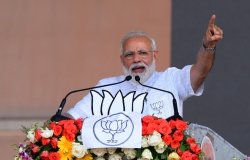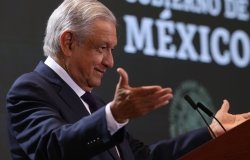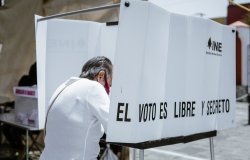Trudeau, Scheer, and the Future of Canada: Canadian Election Special
Overview
The Canada Institute and the Canada-United States Law Institute (CUSLI) convened an in-depth discussion analyzing the outcome of the October 21st federal election. Leading U.S.-Canada analysts, former diplomats and business leaders addressed the implications of the election results for Canadian politics, Canada-U.S. relations, and Canada's engagement with the world.
Selected Quotes
Nik Nanos:
- “17.8 million votes were cast. If 23,000 votes swung, 23,000 out of 17 million, to the Liberals in 14 ridings, they [the Liberals] would have formed a majority government with 32% support.”
- “This is not going to be a weak minority government. They have a partner where they are simpatico on a lot of the major issues.”
- “This was an election from my perspective that was more driven by events than public policy. […] One thing that many Canadians and Americans share is concern about prosperity and concern about where jobs are going to come from in the future. […] For Canadians who followed this particular election, there was really no substantive discussion about this. […] It was not about vision but it was basically just an election about imperfections.”
The Honourable Peter MacKay:
- “To use a good Canadian analogy, it was like having a breakaway on an open net and missing the net.” Peter Mackay with a hockey analogy on the Conservative loss in the recent election.
- “What went wrong? […] People did not want to talk about women’s reproductive rights. They didn’t want to talk about revisiting the issue of same sex marriage and yet that was thrust onto the agenda. And hung around Andrew Scheer’s neck like a stinking albatross, quite frankly. And he wasn't able to deftly deal with those issues when the opportunities arose.”
- “With the tension in the west, with what’s happening in Quebec, and there are number of other domestic issues that he [Justin Trudeau] will have to manage, that will require being home.”
- “But when [USMCA] was described as a win win win in Canada, I said it was… for the Americans.”
Alex Panetta:
- “The Liberals have three potential dance partners so you just need one desperate enough to dance and you’ll survive.” Panetta references the multiple parties Trudeau can work with to pass legislation as a minority government.
- “I think historically minority governments have gotten a lot done.”
- “You’re going to hear a lot of threats to the survival of this government. But I don’t think they are going to necessarily hold much water for the next little while.”
- “Two of the issues in particular I think that are going to emerge relatively early. I think USMCA, if it gets ratified here, will promptly proceed relatively swiftly through the Canadian Parliament. And I think Pharmaceuticals, at some point there is going to be some sort of pharmaceuticals, some prescription drug coverage package that you might expect to get through the House of Commons.”
Chris Sands:
- “I agree with Alex [Panetta] that the USMCA, which may be the biggest bilateral issue, is not going to be controversial if Congress passes it. Then I think in Canada it will be relatively safe sailing.”
- “Foreign policy is going to be a bigger part of this government than what we have seen in the past, in part because it’s an area where the Prime Minister has the ability to represent Canada. […] None of his rivals now have the same international experience that he has had after one term.”
- “[Canada] is not in the middle [of China and the United States]. It has a side. The side is the US side. But the US hasn’t been doing much to help Canada here.”
- “[The selection of a Canadian Ambassador to the US] will be an important decision because that person will have the ability to work here in Washington and advance, maybe a little bit, areas of cooperation of China.”
Selma Lussenburg:
- “We’ve got this terrible dichotomy between the pipeline, which on the one hand is not seen as green, and […] I think the one issue that came out throughout the whole campaign, was climate change. Everyone was talking about it.”
Lawrence Herman:
- “Canada and the United States will inevitably continue to do business together. It will have a lot of uncertainties, but business will be done.”
- “We know in Canada the United States has a global agenda, they are dealing with global issues, and Canada is often forgotten in the scheme of things but the US is the primary world power economically and militarily and I dare say politically and always will be as we see it in Canada.”
- “I think Canada has to do much more on defense expenditures and that in my view, it’s a personal view, means moving ahead and spending much more on reequipping the Navy. The maritime assets that Canada has are out of date and we do have a national shipbuilding strategy, it has to be energized and with that in my view we need to do much more in building Arctic capable vessels because we are woefully short of those at the present time. I think increased defense expenditures would go a long way in helping to smooth the relationship with the United States, because like it or not, Canadians, we are not pulling our weight on defense expenditures, including expenditures for Arctic assets.”
David Jacobson:
- “The United States and Canada are bound together by a whole host of permanent interests. [..] Those permanent interests are going survive the election you just had in Canada, […] they survived the last election we had in the United States, and they will survive the next one. ”
- “[USMCA passage is] just totally over the lot. If you talk to some people they will tell you that it’s for sure going to pass, that the Democrats want to get it passed, that Nancy Pelosi is looking for a path forward. If you talk to others, they will tell you that it’s impossible. […] If I were honest, I’d probably say I don’t know what’s going to happen. It’s balanced on a razor’s edge.”
Event Agenda
Keynote: Public Opinion Analytics of the 2019 Federal Election Results
Nik Nanos
Founder, Nanos Research
Global Fellow, Canada Institute, The Wilson Center
Panel 1: Political Dynamics of a Trudeau Minority Government
- Peter MacKay
- Partner, Litigation, Baker & McKenzie LLP
- Former Minister of National Defence of Canada
- Alex Panetta
- Editor, POLITICO Pro Canada
- Christopher Sands
- Director, Center for Canadian Studies, Johns Hopkins School of Advanced International Studies
- Moderator: Sarah Goldfeder, Principal, Earnscliffe Strategy Group
Panel 2: Canada's Federal Election Results: A Private Sector Perspective
- Lawrence L. Herman
- Counsel, Cassidy Levy Kent
- David Jacobson
- Vice-Chair, BMO Financial Group
- Former United States Ambassador to Canada
- Selma Lussenburg
- Executive Committee and Advisory Board Member, Canada United States Law Institute (CUSLI)
- Moderator: James Blanchard, Co-Chair, Canada-United States Law Institute (CUSLI)
Networking Reception
A networking reception for event participants will follow from 4:00 – 5:00 PM in the Wilson Center Board Room.
Hosted By

Canada Institute
The mission of the Wilson Center's Canada Institute is to raise the level of knowledge of Canada in the United States, particularly within the Washington, DC policy community. Research projects, initiatives, podcasts, and publications cover contemporary Canada, US-Canadian relations, North American political economy, and Canada's global role as it intersects with US national interests. Read more
Thank you for your interest in this event. Please send any feedback or questions to our Events staff.









